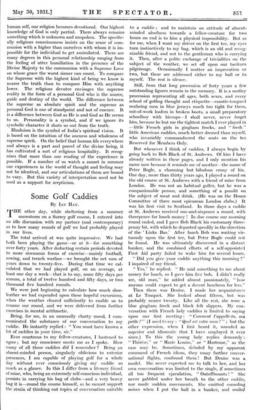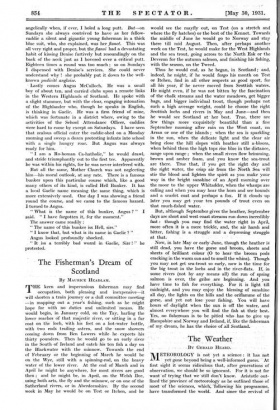Some Golf Caddies
By IAN HAY. THE other day, while sheltering from a summer snowstorm on a Surrey golf course, I entered into an idle discussion with my partner (and contemporary) as to how many rounds of golf we had probably played in our lives.
The total arrived at was quite impressive. We had both been playing the game—or at it—for something over forty years.' After deducting certain periods devoted to more strenuous forms of exercise—mainly football, rowing, and trench warfare—we brought the net sum of years down to twenty-five. During that time we cal- culated that we had played golf, on an average, at least one day a week—that is to say, some fifty days per annum, a total of twelve hundred and fifty days, or two thousand five hundred rounds.
We were just beginning to calculate how much shoe- leather we had expended upon these hopeful excursions, when the weather cleared sufficiently to enable us to resume our round, and we were delivered from further exercises in mental arithmetic.
Being, for me, in an unusually chatty mood, I com- municated the substance of our conversation to my, caddie. He instantly replied : " You must have known a lot of caddies in your time, sir."
Ever courteous to my fellow-creatures, I hastened to agree ; but my conscience smote me as I spoke. How , many of all those caddies did I remember ? Being an absent-minded person, singularly oblivious to exterior presences, I am capable of playing golf for a whole day without ever , consciously giving my caddie so much as a glance. In this I differ from a literary, friend of mine, who, being an extremely self-conscious individual, persists in carrying his bag of clubs—and a very heavy bag it is—round the course himself, as he cannot support the strain, of thinking out topics of conversation suitable to a caddie ; and to maintain an attitude of absent- minded aloofness towards a fellow-creature for two hours on end is to him a physical impossibility. But as for me, when I want my driver on the first tee, my eyes turn instinctively to my bag, which is an old and recog- nizable friend, and not to the gentleman who is carrying it. Then, after a polite exchange of trivialities on the subject of the weather, we set off upon our taciturn pilgrimage. Occasionally I mutter an imprecation or two, but these are addressed either to my ball or to myself. The rest is silence.
Still, from that long procession of forty years a few outstanding figures remain in the memory. It is a motley procession representing all ages, both sexes, and every school of golfing thought and etiquette—caustic-tongued seafaring men in blue jerseys much too tight for them, out-of-work loafers in broken boots, a small preparatory schoolboy with hiccups—I shall never, never forget him, because he lost me the tightest match I ever played in —little French girls in gingham frocks, and " fresh " little American caddies, much better dressed than myself, who invariably commandeered the seats on the tee Reserved for Members Only.
But whenever I think of caddies, I always begin by going back to Bob Black of St. Andrews. Of him I have already written in these pages, and I only mention his name now because it reminds me of another—the name of Peter Bogle, a charming but bibulous crony of his. One day, more than thirty years ago, I played a round on the old course at St. Andrews with a friend of mine from London. He was not an habitual golfer, but he was a companionable person, and something of a pundit on the subject of meat and drink. (He was on the House Committee of three most epicurean London clubs.) It was his first visit to Scotland. In those days a caddie at St. Andrews received one-and-sixpence a round, with threepence for lunch money ! In due course our morning round ended, and I gave Bob Black his customary three- penny bit, with which he departed speedily in the direction of the ' Links Bar.' After lunch Bob was waiting vir- tuously upon the first tee, but Peter Bogle could not be found. He was ultimately discovered in a distant bunker, and the combined efforts of a self-appointed First Aid party failed to wake him for several hours.
" Did you give your caddie anything this morning ?" I inquired of my friend.
" Yes," he replied. " He said something to me about money for lunch, so I gave him five bob. I didn't really see, old man," he added almost passionately, " how anyone could expect to get a decent luncheon for less."
Then there was Denise. I made her acquaintance at Le Touquet. She looked about fifteen, but was probably nearer twenty. Like all the rest, she wort a blue gingham frock and black felt slippers. My con- versation with French lady caddies is limited to saying upon our first meeting : " Comment t' appelle-tu, ma petite ?" (I used to say : "Quel est votre nom ? " ; but the other expression, when I first heard it, sounded so superior and idiomatic that I have employed it ever since.) To this the young lady replies demurely : " Therese," or " Marie Louise," or " Hortense," as the case may be. Sometimes, deluded by my apparent command of French idiom, they essay further conver- sational flights, confound them ! But Denise was a model. She never expected me to talk to her, and her own conversation was limited to the single, if sometimes all too frequent ejaculation, " Outoffbounts ! " She never gabbled under her breath to the other caddie, nor made sudden movements. She emitted consoling noises when I put the ball in a bunker, and smiled angelically- when, if ever, I holed a long putt. But—on Sundays she always contrived to have as her fellow- caddie a silent and gigantic young fisherman in- a thick blue suit, who, she explained, was her fiancé. This was all very right and proper, but the fiance had a devastating habit of kissing Denise furtively but resoundingly on the back of the neck just as I hovered over a critical putt. Eighteen times a round was too much ; so on Sundays I dispensed with Denise's services. She could never understand why ! she probably put it down to the well- known pudicite anglaise.
- Lastly comes Angus McCulloch. He was a small boy- of about ten; and-carried clubs upon a remote links in the Western Highlands: of Scotland. He spoke with a slight stammer, but with the clear, engaging intonation of the Highlander who, though he speaks in English, is thinking in Gaelic. He -was a firm friend of mine, which was fortunate in a district where, owing to the activities •of the -School Attendance Officer, caddies were hard to- come by except on Saturdays. I -have seen that zealous official enter the caddie-shed on a Monday morning and sweep a dozen protesting infants into school with a single hungry roar. But Angus_ was always ready for him. - " I am a Ro-homan Ca-hatholic," he would drawl, and stride triumphantly out--to the first tee. 'Apparently he was within his rights, for he was never interfered- with.
But all- the -same, Mother Church was not neglecting him—his moral outlook, at any rate. There is a famous bunker upon this particular course which, he a good many others of • its kind, is called Hell Bunker. It has a local Gaelic name meaning the same thing, which is more extensively- used. One day I was showing a friend round the -course,- and we came to the famous hazard. I turned -to Angus.
" What is the name of this bunker, Angus ? " I said. " I have forgotten it, for the moment."
The answer came readily : " The name of this bunker iss Hell, sirr."
" I know that, but what is its name in Gaelic ? " Angus looked profoundly shocked.
" It iss a terribly bad worrd in Gaelic, Sirr ! " he protested..







































 Previous page
Previous page